Tom Banse
Regional Correspondent
About
Tom Banse covers national news, business, science, public policy, Olympic sports, and human interest stories across Washington state. Now semi-retired, Banse is an Olympia-based reporter with more than three decades of experience covering the Pacific Northwest. Most of his career was spent with public radio's Northwest News Network, but now in semi-retirement his work appears on multiple nonprofit news outlets including KUOW. His recent areas of focus range from transportation, U.S.-Canada borderlands, the Northwest region's planned hydrogen hub, and emergency preparedness.
Previously, Tom covered state government and the Washington Legislature for 12 years. He got his start in radio at WCAL-FM, a public station in southern Minnesota. Reared in Seattle, Tom graduated from Carleton College in Northfield, Minnesota with a degree in American Studies.
Location: Olympia
Languages: English, German
Stories
-

Before enormous, emotional crowd, Boeing delivers final 747
Thousands of former and current Boeing workers joined customers and other guests to bid farewell to the company's final 747 jumbo jet. The hours-long celebration for the so-called “Queen of the Skies" took place in the giant building that once housed the 747 production line.
-
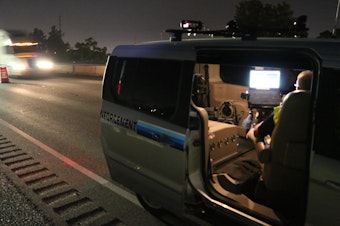
Roadway carnage has lawmakers pitching everything from more photo radar to fewer right turns on red
State lawmakers in Olympia are debating a suite of possible new responses to surging traffic fatalities. Those include authorizing photo radar in highway work zones, prohibiting right turns at many red lights, and lowering the breathalyzer limit to convict for drunk driving. Some of these ideas have corollaries in Oregon, where the legislative machinery is getting revved up too.
-
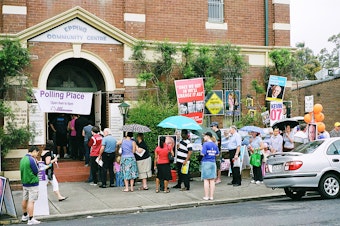
What if voting were not just a right, but a legally required duty?
Numerous Democrats in the Washington Legislature are backing a new proposal to make voting in elections compulsory. Citizens are required by law to cast ballots in about 25 counties, but in no other U.S. states. Republicans in Olympia described the idea as "un-American."
-
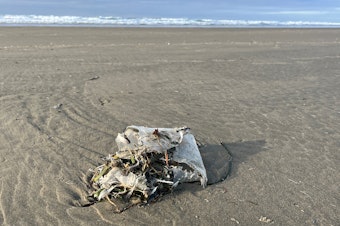
Foam dock floats, laundry filters, hotel shampoo amongst newest bids to reduce plastic pollution
Everywhere they look, Pacific Northwest scientists find teeny-tiny plastic pollution. Broken down particles are in our water, falling out of the air, in salmon, shellfish and in our own bodies. Scientists, environmental advocates and Democratic lawmakers in Olympia and Salem have seen enough to make them seek more regulations.
-
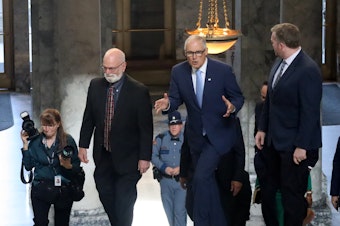
Gov. Inslee leans into housing and homelessness in 2023 State of the State address
Washington Gov. Jay Inslee emphasized housing construction and homelessness response during his 2023 State of the State address on Tuesday. The issue is a bipartisan priority for the state legislature, but approaches differ among the lawmakers who convened in Olympia this week.
-
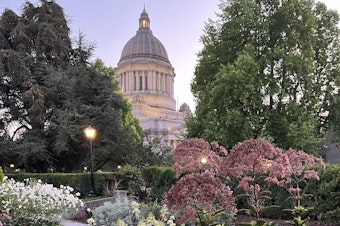
6 issues atop the agenda for the 2023 Washington Legislature
Washington state voters and lawmakers appear to be in close alignment on their top priorities for the incoming Washington Legislature. The 2023 session gavels to order at noon on Monday, January 9.
-

Pacific NW 'hydrogen hub' pitch to federal government treated as top secret
The states of Washington and Oregon have submitted a joint bid to the U.S. Department of Energy to get a share of $8 billion that Congress set aside to launch "Regional Clean Hydrogen Hubs" around the nation. But good luck trying to learn what exactly the bi-state bid entails, other than the safe presumption that at least one industrial hydrogen production facility would be subsidized.
-
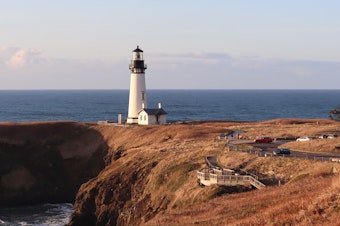
Lighting the way for 150 years: Yaquina Head Lighthouse prepares for sesquicentennial
The stewards of Oregon's tallest lighthouse are sprucing up the popular landmark on Oregon's central coast for its 150th anniversary in 2023.
-
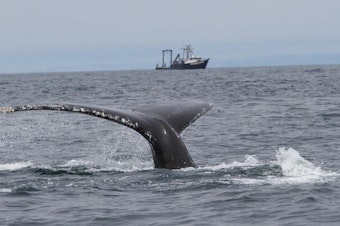
Lots of whales spotted around offshore wind farm zones along West Coast
The federal government has commissioned Oregon State University to look into the possible impacts of offshore wind farms on marine wildlife. In the first year of this four-year project, the researchers spotted sizable numbers of seabirds and whales – including the largest animal on Earth – in the Oregon and Northern California areas that could one day host floating wind farms.
-
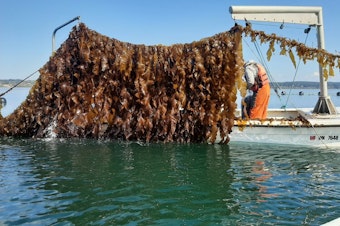
Swelling school of seaweed farmers looking to anchor in somewhat choppy Northwest waters
Prospective kelp growers who want to join the handful of existing commercial seaweed farms in the Pacific Northwest are having to contend with a lengthy permitting process. It's gotten contentious in a few cases, but even so, at least a couple of new seaweed farms stand on the cusp of approval. Their harvests could be sold for human food, animal feed or fertilizer.